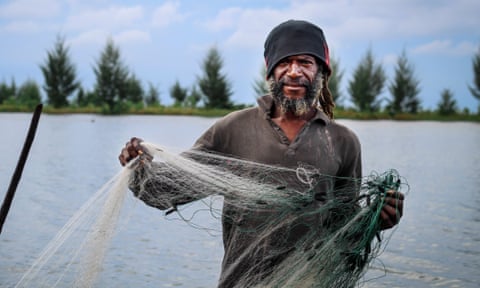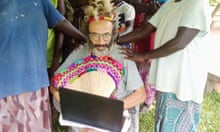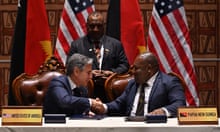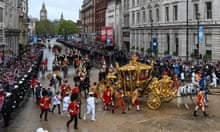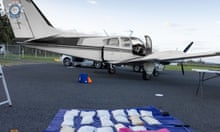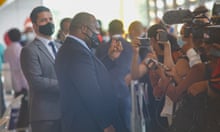While across the Pacific communities are dealing with shrinking coastlines, one area in Papua New Guinea has an altogether different problem: a new island that has solidified and started supporting vegetation in the last few years has caused tensions and even outbreaks of violence as competing clans lay claim to the land.
That fight has been intensified as communities struggle to deal with the consequences of warming oceans and the devastating impact of natural disasters.
The island, off the village of Gona in Oro province, and accessible by canoe, has gradually formed from three smaller islands over the course of two decades but has only solidified over the past few years.

Uninhabited bar the occasional fisherman, it is now home to diverse local flora. Tropical pine (Klinki pine) make up the majority of trees while low-growing shrubs cover the rest of the island.
“At first [when forming], it was made entirely of just crushed coral and sand, but now there’s soil and we see vegetation that normally only grows in soil,” says Simon Seboda, a local fisherman. “We haven’t planted anything. Everything sprang up naturally and on its own. The rain and waves wash a lot of seeds on to the island.”
But the island’s emergence from the waves has caused tensions among two local clans, which have taken the matter to village and district courts in a bid to resolve the dispute. On several occasions they have come to blows, including one instance in which a man was stabbed.
Members of the Yega tribe say their ancestors first settled the mainland opposite the island hundreds of years ago, in a village called Waususu, and eventually moved inland.

But the Garara people who now live along the coastline have also laid claim to the island.
“If you look at old maps, the land didn’t exist back then,” says deputy provincial administrator Joe Mokada. “And so, when warring tribes fought over land, this land wasn’t there to be fought over.
“But, in recent years, the island was formed, vegetation started growing there and people feel entitled to the land but we have to determine who, if anyone, it belongs to. It’s a strange phenomenon, in which, while other parts of the Pacific, they are losing land to rising sea waters – we are instead gaining land.”
‘Our generation will feel the full brunt of climate change’
The formation of the island is yet to be studied. Locals say that the government and environmental experts have not visited the area to investigate.
However, the community believes the island formed as wind and waves repeatedly deposited sediment – potentially pollution from a local palm oil factory – parallel to the shoreline, similar to the formation of a barrier island.

“Since the late 80s, when the oil palm factory commenced production, we have seen pollution in our ocean that came down from the Bangoho River [mouth]. We noticed the coral started dying and the fish population decreased,” says Seboda.
“We especially noticed a drastic change after Cyclone Guba devastated [the province of] Oro in 2007. Coastal villages from Binjefada to Garara [along the Gona coast] were destroyed. But while these villages were destroyed, this island started forming.”
Schneider Yasi, a private geologist for Kingston Resources who has reviewed maps of the area, thinks the island is likely to have been formed by sediment deposits.
“It may have been a reef system that was eventually engulfed by the delta’s continuous sedimentation,” he said.
The dispute over the new island has also disrupted plans by local marine association Kikiri Local Marine Management Area (KLMMA), formed by youth from the area, to protect and sustainably manage marine resources in the area.
The association began planting mangroves around the island to protect the surrounding wetlands and ecosystems, with future plans to turn the island into an ecotourism attraction. However, their plans were abruptly halted by local village elders.

“The older generation won’t be around to feel the worsening effects of climate change, yet they are the ones putting a halt to our plans, just to argue over whose land it is,” says Elijah Yapuri from Banumo village and a member of the association.
“Our generation will feel the full brunt of climate change and are already seeing it with our corals dying, villages going under and so we are pushing to continue efforts to protect these resources for future. But they don’t see it that way.”
‘Nowhere else to go’
The effects of the climate crisis are evident in Oro province and have intensified the dispute over this new land, as villages are destroyed by cyclones, or submerged by king tides, and food sources, like fish, become more scarce.
Local fishermen say they have to go some miles out into the ocean to fish because the water around the coast is too warm for fish and other sea creatures.
“Years ago, fish was abundant in this area,” Seboda says. “We used to simply throw our nets out and fetch tons of fish, and a variety of them too.

“But now the water is too hot for them and the coral reefs near land have died so they have migrated further out into the ocean, away from the land, so we have to travel further out there on our canoes to fish. I worry that one day we won’t have any fish in the ocean.”
The villages that lined the once thriving coastline are now few and far between. A few tall, sturdy coconut trees are all that is left of the villages destroyed when Cyclone Guba hit in 2007. Oro was particularly badly affected and 149 people were killed.
Waususu, once a populous village, is now regularly inundated with water. Places where houses used to stand are now covered in mangroves and swamp.
“We are standing where the centre of the village used to be,” Seboda says, as he stands knee-deep in a lagoon. “Because of the cyclone and the sea levels rising, the people had to flee inland and settle where they could, because all land here is customary land.”

“When it’s high tide, the water comes all the way in, and we walk around with the water all the way to our ankles, that’s why our houses are built high above on long, wooden stilts,” one villager, Mary, says.
“There is no beach when the tide is high. The water rises over the beach which forces people passing by to come through our village to avoid the water.
“We are used to it now. We have no choice but be used to it … we have nowhere else to go.”
